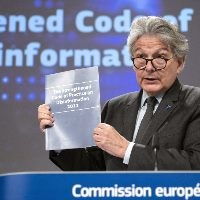(BRUSSELS) – With Russia weaponising disinformation as part of its military aggression in Ukraine, online platforms signed a strengthened code of practice Thursday committing them to fight disinformation online.
The 34 signatories, including platforms, tech companies and civil society, followed 2021 Commission Guidance and took into account the lessons learnt from the COVID19 crisis and Russia’s war of aggression in Ukraine.
The European Commission welcomed the new code. “We now have very significant commitments to reduce the impact of disinformation online and much more robust tools to measure how these are implemented across the EU in all countries and in all its languages,” said EC vice-president Vera Jourova: “Users will also have better tools to flag disinformation and understand what they are seeing. The new Code will also reduce financial incentives for disseminating disinformation and allow researchers to access to platforms’ data more easily.”
There should also be no financial incentive to spreading disinformation, said Commissioner Thierry Breton: “To be credible, the new Code of Practice will be backed up by the DSA (Digital Services Act) – including for heavy dissuasive sanctions. Very large platforms that repeatedly break the Code and do not carry out risk mitigation measures properly risk fines of up to 6% of their global turnover.”
The 34 signatories include major online platforms such as Meta, Google, Twitter, TikTok, and Microsoft, as well as a variety of smaller or specialised platforms, the online ad industry, ad-tech companies, fact-checkers, civil society or that offer specific expertise and solutions to fight disinformation.
The strengthened Code aims to address the shortcomings of the previous Code, with stronger and more granular commitments and measures, which build on the operational lessons learnt in the past years.
Concretely, the new Code contains commitments to:
- Broaden participation: the Code is not just for big platforms, but also involves a variety of diverse players with a role in mitigating the spread of disinformation, and more signatories are welcome to join;
- Cut financial incentives for spreading disinformation by ensuring that purveyors of disinformation do not benefit from advertising revenues;
- Cover new manipulative behaviours such as fake accounts, bots or malicious deep fakes spreading disinformation;
- Empower users with better tools to recognise, understand and flag disinformation;
- Expand fact-checking in all EU countries and all its languages, while making sure fact-checkers are fairly rewarded for their work;
- Ensure transparent political advertising by allowing users to easily recognise political ads thanks to better labelling and information on sponsors, spend and display period;
- Better support researchers by giving them better access to platforms’ data;
- Evaluate its own impact through a strong monitoring framework and regular reporting from platforms on how they’re implementing their commitments;
- Set up a Transparency Centre and Task Force for an easy and transparent overview of the implementation of the Code, keeping it future-proof and fit for purpose.
Finally, the Code aims to become recognised as a Code of Conduct under the Digital Services Act to mitigate the risks stemming from disinformation for Very Large Online Platforms.
Signatories will have 6 months to implement the commitments and measures to which they have signed up. At the beginning of 2023, they will provide the Commission with their first implementation reports.
Central hub on the Code of Practice on disinformation
Strengthened Code of Practice - background guide
2022 Strengthened Code of Practice
Evaluation of the Code of Practice
Policy page on the Code of Practice
List of signatories and commitments (updated on a rolling basis)


